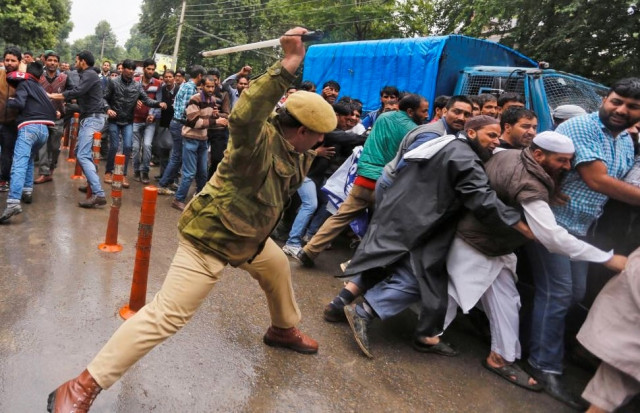Highway push engulfs farmers' land in IIOJK
Kashmiri farmers fear land loss amid India's infrastructure push, calling it a "settler colonial land grab."

Farmers in Indian-Illegally Occupied Jammu and Kashmir say a major government infrastructure drive is taking their deeply cherished land, fearing it spearheads a push to "Hinduise" the disputed Muslim-majority territory.
Musadiq Hussain said that police "destroyed" his rice crop when a large chunk of his smallholding was expropriated to make way for a four-lane, 60-kilometre (40-mile) highway around Srinagar.
"It has affected my sense of who I am and my self-respect," said 41-year-old Hussain, adding he can no longer grow enough rice and vegetables to feed his family.
"I feel like my mind is shrinking, just like my land."
Hussain's land was taken in 2018 but the process has intensified in recent years.
The road, along with other highways and railways, is also swallowing swathes of orchards prized for their almonds, apples and other fruit in the Himalayan region.
Prime Minister Narendra Modi's Hindu-nationalist government, which imposed direct rule in 2019, says that the multi-billion-dollar drive is bringing a "new era of peace" and "unprecedented development".
New Delhi says it will boost trade and tourism, while also bolstering military access across the restive territory and to strategic border zones with Pakistan and China.
Authorities say construction within 500 metres (yards) on either side of the highway around Srinagar is banned.
But last year, authorities unveiled plans to build more than 20 "satellite townships" along the route, with drawings showing highrise developments it called a "Pearl in the Paradise".
Political parties in IIOJK are demanding to know who the housing is for, accusing Modi's government of wanting to change Kashmir's demographic makeup to create a Hindu majority.
Goldie Osuri, who studies Indian policies in Kashmir at Britain's University of Warwick, uses a phrase often associated with Israel's occupation of the West Bank to describe the situation: a "settler colonial land grab".
"Kashmiri farmers... are being dispossessed of their land and livelihoods in the name of Indian development as 'a gift' for Kashmir," Osuri told AFP.
She called the project a bid to "'Hinduise' Kashmir at the expense of Kashmiri Muslims".
"This is a land grab in plain sight," said Waheed Ur Rehman Para, a member of Kashmir's local assembly.
Many say that has undermined previous land reforms that granted ownership or farming rights to hundreds of thousands of people. It worries Kashmiri leaders.
"We want this land to remain ours", Modi critic Omar Abdullah, Kashmir's chief minister, told a rally last month. "Without it, what do we truly possess?"
But Siddiq Wahid, a historian at India's Shiv Nadar University, said that the region's political parties showed "no intent to unite, only to pull each other down".
"In this lazy politics lies the chief worry for us all", he said.
Elsewhere, in the village of Dirhama, farmers are angry at their land being requisitioned for a new train station, serving a 40-kilometre railway to an important Hindu shrine.
Standing in a field as snow fell, apple farmer Mohammad Ramzan said there was no room for a railway line.
"Where is the space? We all have our small patches of land. Where will we go?" asked the 78-year-old.
The plan has struck a nerve in Kashmir, where land and identity are deeply intertwined.
"This self-sustenance has ensured Kashmiri survival despite decades of curfews, strikes and uprisings," said Osuri. Mohammad Shafi, a 61-year-old farmer, asked: "What is this development for when my family will be landless?"



















COMMENTS
Comments are moderated and generally will be posted if they are on-topic and not abusive.
For more information, please see our Comments FAQ